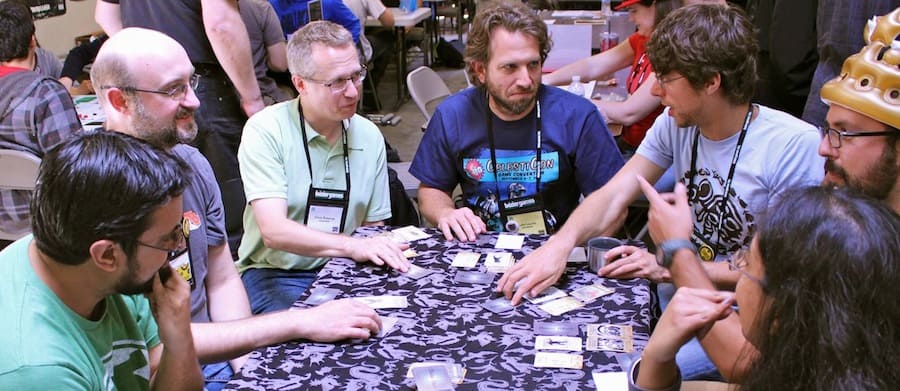
There are many stages to game creation. You begin with design, transition into development, and finally focus on promotion. The one constant through all of those steps is playing the game. And there is no more reliable player than yourself.
But if you’re like me, you can get a little too competitive when you play. I’m serious enough about games that I dedicate most of my time and thought to them, so it shouldn’t be surprising that I get pretty serious while playing them. Unfortunately, this can lead to uninformative tests when you’re developing and missed sales when you’re promoting. And I doubt I’m the only designer with this problem.
So today I thought I’d share some of the tricks I’ve discovered to be a better player of my own games. I hope you find these tips helpful, and I welcome additional suggestions in the comments!
DESIGN & DEVELOPMENT
When you’re designing and developing your game, you’ll playtest it countless times. But don’t think that simply playing your game is playtesting it. You should approach each playtest with the mindset that you are trying to learn specific things about your game. You’ll start by exploring the possible base game systems, then experiment with different components and special rules to flesh out the structure, and finally make sure that everything is balanced. And you can take part in almost all of those playtests.
Solo play. Before you ever show your game to others, it’s a good idea to try it yourself. Obviously, if there is hidden information, bluffing, or even an advantage to knowing your opponents’ intended moves, you won’t get a full idea of how the game plays. But playing a solo round or two is a great way to make sure nothing in the game is terribly broken and ensure there is actually something interesting to think about while playing. It will also ensure that you have concrete rules to explain when you do bring other playtesters in. Really, it’s only polite to try a new game yourself before you ask others to test with you.
Exploration. When you start designing a game, your earliest playtests should focus on understanding the game systems and trying out different core structures. In other words, no playtesters should expect a particularly fun experience, and instead should try to determine what works and what doesn’t. At this stage, you should really be focused more on evaluating the current version and brainstorming alternate options than trying hard to win.
General feel. Throughout testing, you should be paying attention to more than the game systems. You should really pay attention to the player experience. And your own opinion is totally valid in this regard. Obviously, you can’t rely on it, since the game will have a special place in your heart. But if you don’t enjoy yourself while playing your own game, chances are no one else will either.
Strange strategies. Once the core systems are in place, you’ll still have a lot to test, especially when it comes to determining which mechanics and special powers you want to include in your game. By this point, you’ll probably know the game much better than the other players. But you can still help with testing by experimenting with off-the-wall strategies. Most of these won’t work, which will give the other playertesters a chance to do well, and when they do work you’ll want to know about it!
Trolling. I don’t recommend doing this for most playtests, but it’s worth trying out extreme strategies (like being maximally aggressive or defensive) to see how annoying and effective they are. I guarantee players will try these strategies when the game is out in the wild, and it’s important to make sure that they don’t spoil the experience for the rest of the players.
Balance. Once you’ve settled on the core systems and figured out what you want to include in the game, it’s time to balance everything. This is a long, challenging process, but you can participate in balancing playtests as long as your playtesters are of a similar skill level to you. If you have a core group that knows the game about as well as you do, go crazy and try to find optimal strategies so you can tone them down as necessary. If you’re playing with new players, though, your test will be a waste of time if you try too hard.
Blind playtesting. Blind playtesting involves players reading the rules and playing the game without any outside help. It simulates a player opening the box and playing for the first time. Blind playtesting is absolutely essential if you’re serious about game design, and obviously, you can’t play in blind playtests. You should sit back and watch players struggle to understand the game without speaking or participating in any way. It will be uncomfortable. It will be awkward. But it will make your game much, much better. This is the only kind of playtest that you cannot play in under any circumstances.
PROMOTION
Once your game is finished, it’s time to start promoting it! You’ll need people to help fund it on Kickstarter (most likely) and buy it when it’s released (definitely), and the best way to get people to do that is to let them try it.
But let me tell you, nothing sours a game experience like the designer winning. And nothing is more fun than defeating a designer at their own game! For this reason, you should try really hard not to win games when you’re promoting.
Below are some of the tricks I use to have fun while I’m promoting while also making sure the play sells the game.
Show off your game. All games shine in some circumstances more than others. If you can set up your players to encounter those circumstances, your game will come across as that much better! (Of course, if your game doesn’t naturally develop into fun circumstances, you have deeper problems to deal with. But even well designed games have more and less fun plays, so try to make your promotional play more fun!)
Set up cool moves. You know what’s fun in games? Feeling clever. Help your players feel clever by setting them up to make cool, game changing moves! (And no, pulling those moves on the players is not nearly as fun.)
Keep the play suspenseful. Close games tend to be a lot more exciting than total blow-outs. Helping to keep those scores as balanced as you can over the course of a play is not only a fun challenge, it will make the game more enjoyable for your players.
Show off strange strategies. For many people, what’s most fun about games is getting creative and doing unexpected things. If you’ve hidden some fun, strange strategies in your game, get crazy in your promotional games and employ some of the wackier strategies your game allows.
And that wraps up my advice for playing your own game! If you have any other tips or suggestions, feel free to share in the comments! I’d also be curious to hear about other struggles designers have while playing their own games, if not having trouble controlling your urge to win.
Before I sign out for today, I want to mention one last thing. If you’re serious about releasing a game, you will be playing it a lot. I mean hundreds of times. Be absolutely sure the game you’re working on is a game you would enjoy playing that much!








